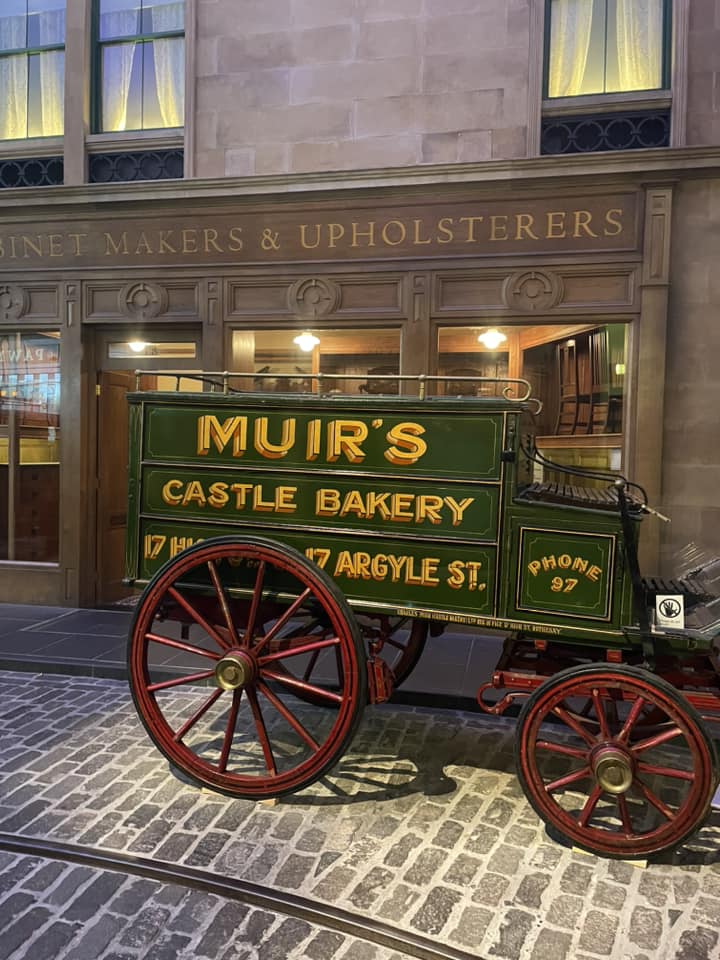Breadspotting, Act 1, Scene 1

Historical fiction, set in the East End of London in 1856, in which a gang of delivery drivers for a family owned bakery take on a big firm moving into the area with bad bread and strong-arm tactics.
The aroma of fresh bread fought an uneven battle with the reek of old garbage and the brimstone of coal smoke. The ovens rolled out their savory scent in massive waves from midnight til dawn, compensating in quantity for lack of strength. The garbage had entrenched for weeks, though, and the soot and sulfurous haze were ever present in the London of the Industrial Revolution, the great metropolis still dependent on localized fossil fuel sources.
And muscle power. A slow clopping of draft horse hooves, shoes ringing dully against the cobbles, beat a slow march for the jingle and creak of harness, the groaning of wooden axles, and the grinding of iron-shod wagon wheels on stone. Sounds went strangely muffled in the predawn fog, yellowish in some areas, the Particular that makes the eyes smart and catches in the throat. A cress girl, maybe fourteen, a little old for the trade, paused on her way to the central produce market to buy watercress for her basket, empty now and swinging lightly in hands that would find it twice as heavy in the same state by end of day. She leaned against the bakery's front wall, old stone etched by decades of London's foul air and fouler rain, and coughed, a deep, racking spasm that shook her for a long, tortuous moment. Then the storm passed, and she breathed cautiously, fearing to set off another wave, reading the sign over the door in her mind to pass the time, O'Shaughnessy's Baps and Rolls. Quiet remaining, she dabbed at her lips with a soiled handkerchief, frowned at the addition to the rust-colored stains, and took up her basket and her way once more.
Kept mostly out by the stable's stone walls and heavy doors, sagging slightly at the hinges, the last wisps of the sulfurous smog and the chill were fended off by a steady push of heat from a cast iron stove, a blocky old beast that glowered sullenly in its corner, the stone around it swept carefully bare of straw and debris. A handful of people worked among the stalls and in the open space by the doors, three harnessing draft horses, one standing back and supervising with a gruff demeanor and the occasional throat-clearing and a pointing finger, and the last doing the sweeping up and general scut. The fourth, an older man, beard gone mostly to iron grey, hair just mostly gone, took his unlit pipe out of his mouth and pointed it at a fourth stall, the door still closed, horse still in residence. This was an anomaly, and he did not like anomalies.
Then the postern door flew open with a bang and a child, maybe ten, hard to tell under the grime and rags of living on the street, tumbled in, frantic, and hit the straw and dirt floor gasping for breath, flailing and scrambling to get back up.
"Keith?" The woman harnessing the middle horse took a quick step toward him. Hair shorter than the men's, dressed the same, her voice a rough contralto. "What - ?"
"Dapper!" Keith forced out through gritted teeth, wheezed frantically for breath, lunged to his feet, staggered, one knee scraped and starting to bleed. "Stickers!" He hauled mightily at the air, trying to get enough into his lungs. "Beatin' Dapper!"
The woman who'd spoken was out the postern and up the street like a terrier after a rat, the stable boy hot on her heels, carrying a manure rake like a polearm. The rest followed, having paused only briefly to seize their own implements of destruction.
One shouted down the alley between stable and bakery, "Come quick, Stickers're beatin Dapper!"
A hue and cry went up, and the folk that had been tending the wagons and putting the first products aboard for delivery came boiling out like ants from a hill, but with more direction, purpose, and bloodlust. Each carried a utility knife in one hand, a big hooked blade on a wooden handle, tool of the trade, and whatever had been ready to hand in the other, Aprons flapping like tabards, the ragtag militia charged into battle like folk such as they had done since time immemorial.
Left behind, the stable master shook his head, tucked his pipe away in a pocket, and set to getting the harnessing finished and the horses back into their stalls.